home > articles > The Five Pillars of Reformed Christianity > Part 1, Sola Scriptura
Denominations are generally waning in this “post-modern” era. Along with the rise of non-denominationally aligned churches has been a growing doctrinal vacuum as preachers become life-coaches and the emphasis is on making the Bible a “How to…” book. A casual reading of some of these churches doctrinal statements reveals some glaring departures with historic Christianity, which should cause us to wonder how or why they differ so much with the 5 Pillars of Biblical Christianity…
PART 1 – SOLA SCRIPTURA
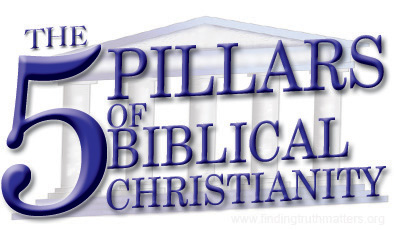 Biblical Christianity commences with the authority of Scripture. Some might say that it commences with Christ. But without the revelation of Scripture we wouldn’t know that! Against the backdrop of a Papal Church usurping authority to lord it over those who would follow Christ, the Reformers protested that such usurping was contrary to what the Scriptures permitted. When confronted with the option of obeying God’s Word or the contradictory commands of men, the early apostles said-
Biblical Christianity commences with the authority of Scripture. Some might say that it commences with Christ. But without the revelation of Scripture we wouldn’t know that! Against the backdrop of a Papal Church usurping authority to lord it over those who would follow Christ, the Reformers protested that such usurping was contrary to what the Scriptures permitted. When confronted with the option of obeying God’s Word or the contradictory commands of men, the early apostles said-
But Peter and the apostles answered, “We must obey God rather than men.”
Acts 5:29
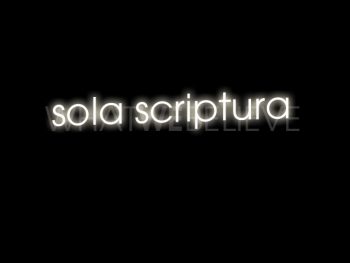

An artist’s impression of William Tyndale translating the New Testament into English
William Tyndale was one of the first reformers to defy the Papal church leadership and teach that the Bible was a higher authority than the Pope. For this stand he paid a terrible price (being burned alive at the stake). Not only did he teach this doctrine of Sola Scriptura he trained lay preachers (derogatively referred to as “Lollards” ’empty heads’) to preach it across England. He then worked on translating the Scriptures into the common language of the people and was able to do something that Wyclif over a hundred years earlier was unable to do: he published his English Bible by means of the newly invented printing press. Tyndale died to make the English Bible available to the Spiritually hungry. I wonder what mixed emotions he would feel today if he could see the number of Bibles in the homes of Christians today and how little they were actually read! (Research shows that only 2% of Christians have read the entire Bible.)
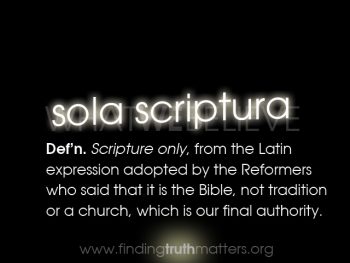 Sola Scriptura means that God has given us no higher revelation of His Will, Ways and Word than the Bible. We don’t worship the Bible, but we heed its message that God alone deserves worship. Neither does Sola Scriptura mean that God has not given us other reliable revelations of His truth. The Scriptures make it plain that God has revealed His righteousness through ‘the heavens’, stars and planets, (Psalm 97:6); and that God has revealed His glory also through the heavens (Psalm 19:1); and according to Romans 1:20, through everything that He has created. The Belgic Confession refers to this as God’s “Two Books” – the record of Scripture and the record of Nature.
Sola Scriptura means that God has given us no higher revelation of His Will, Ways and Word than the Bible. We don’t worship the Bible, but we heed its message that God alone deserves worship. Neither does Sola Scriptura mean that God has not given us other reliable revelations of His truth. The Scriptures make it plain that God has revealed His righteousness through ‘the heavens’, stars and planets, (Psalm 97:6); and that God has revealed His glory also through the heavens (Psalm 19:1); and according to Romans 1:20, through everything that He has created. The Belgic Confession refers to this as God’s “Two Books” – the record of Scripture and the record of Nature.
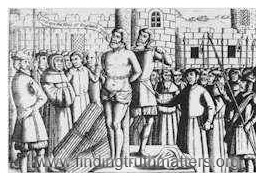
An artist’s etching of the martyrdom of William Tyndale
Therefore, Sola Scriptura is not saying that Scripture is the only way of knowing the truth, but it is saying that Scripture is the highest authority of the truth. It was Thomas Aquinas who reasonably argued based on these Scripture passages that the truth of God is communicated via the created order (apprehended by ‘reason’) and the Scriptures (apprehended by ‘revelation’).

An artist’s impression of Thomas Aquinas
But while reason and revelation are two distinct sources of truths, the truths are not contradictory; for in the last resort they rest on one absolute truth — they come from the one source of knowledge, God, the Absolute One.
Thomas Aquinas (1225 – 1274)
It was Clement of Alexandria (ca.160 – ca. 215AD) who is credited with saying something similar to this first when he said, All truth is God’s truth wherever it may be found. But Sola Scriptura declares that Scripture has a unique authority for the truth. Therefore, while Scriptural revelation does not need to be established by the testimony of nature, its authority is most certainly confirmed by it. This means that archaeology does not prove Scripture’s authority, it merely confirms it. The same can be said for physical science. For example, cosmologists observe that the universe is moving (expanding) from a central starting point. The Scripture spoke of God doing this when He created the universe by “stretching out the heavens” (note, Job 9:8; Psalm 104:2) which is precisely what cosmologists now observe.
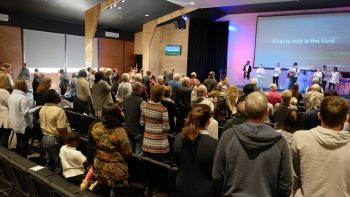 But Charismatics and Pentecostals generally don’t subscribe to all that Sola Scriptura means. While the Scripture itself tells us not to despise prophecy (1Thess. 5:20), and that prophecy is a vital gift of the Holy Spirit (1Cor. 12:10), too many charismatic Pentecostals have attributed personal prophecy to the status of Scripture. Most don’t realise they are even doing this. Yet when a person prophesies that God is about to pour out His Revival Spirit, how many people realise this is counter to what the Scripture says?
But Charismatics and Pentecostals generally don’t subscribe to all that Sola Scriptura means. While the Scripture itself tells us not to despise prophecy (1Thess. 5:20), and that prophecy is a vital gift of the Holy Spirit (1Cor. 12:10), too many charismatic Pentecostals have attributed personal prophecy to the status of Scripture. Most don’t realise they are even doing this. Yet when a person prophesies that God is about to pour out His Revival Spirit, how many people realise this is counter to what the Scripture says?
The Reformers reacted strongly to the Roman Catholic claim that Church tradition, as decreed by Popes, was equal in authority to Scripture. Even today, many Roman Catholics claim that it was the authority of the (Catholic) Church that recognised the Canon of Scripture. Therefore, they reason, Scripture would have no authority at all if it wasn’t for the authority of the Church. But this is not a valid argument. If asked: How is it that we know that Christ authorised the Church? We are told: “The Scriptures reveal that Christ has established the authority of the Church.” The circular reasoning becomes obvious. If the authority of the Scriptures was not established until the Church recognised the Canon of Scripture, then prior to that happening it presumably had no authority to establish the authority of the Church. In fact, the Roman Catholic Church did not recognise the Canon of Scripture until the Council of Trent in 1546!
BIBLIOLATRY?
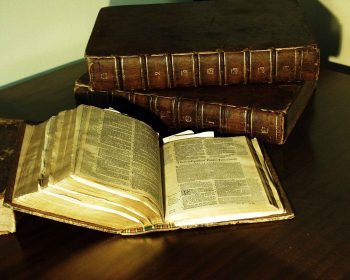 Because of the preeminence with which Protestants place on the authority of Scripture, this has led to some Roman Catholics to accuse Protestants of making an idol of the Bible – Bibliolatry. But this is a gross mischaracterisation of what Protestants believe about the Bible and how its authority regarded. To idolise something is to worship it. For Christians, the Bible is not our object of worship but an instrument for our worship. We sing songs to God based on the words of Scripture. We do not pray to the Bible – because that would be idolatry since prayer (talking to our God) is the frame-work for all worship. (This is why Protestants do not pray to dead saints as this is forbidden in Scripture. See Isaiah 8:18.)
Because of the preeminence with which Protestants place on the authority of Scripture, this has led to some Roman Catholics to accuse Protestants of making an idol of the Bible – Bibliolatry. But this is a gross mischaracterisation of what Protestants believe about the Bible and how its authority regarded. To idolise something is to worship it. For Christians, the Bible is not our object of worship but an instrument for our worship. We sing songs to God based on the words of Scripture. We do not pray to the Bible – because that would be idolatry since prayer (talking to our God) is the frame-work for all worship. (This is why Protestants do not pray to dead saints as this is forbidden in Scripture. See Isaiah 8:18.)
SOLA SCRIPTURA IS THE FOUNDATION
When looking to define a doctrinal position for Biblical Christianity we concur with the Reformers who commenced with Sola Scriptura. This presumes infallibility and inerrancy. It also logically leads to an acceptance of divine preservation (God preserves His Word). Considering the price that the Reformers paid to champion this position it is perhaps remarkable how little it is read or heeded of Scripture today. May God grant you and me a greater passion for His Word- to read it and heed it.
Amen.
Dr. Andrew Corbett, June 20th 2006
Next … PART 2, Solo Christo
Part 1- Sola Scriptura | Part 2- Solo Christo | Part 3- Sola Gratia | Part 4- Sola Fide | Part 5 Soli Deo Gloria | Printable Bible Studies
-
Sale!
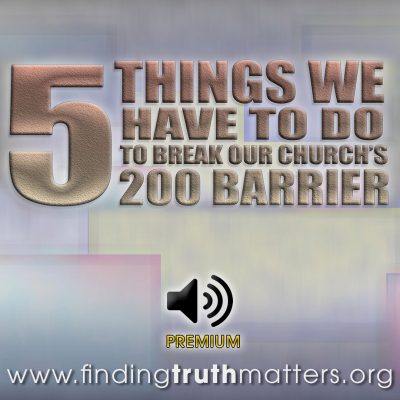
5 Things We Need To Do To Break Our Church’s 200 Barrier, Premium Audio
Original price was: $1.75.$0.95Current price is: $0.95. -
Sale!

A Morning With Izaak Walton – The Compleat Man, Premium Audio
Original price was: $1.75.$1.25Current price is: $1.25. -
Sale!
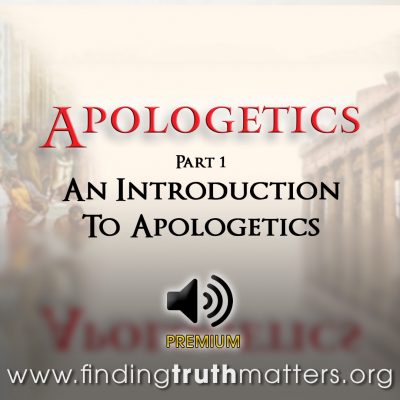
Apologetics Part 1 – Introduction To Apologetics, Premium Audio
Original price was: $1.75.$0.95Current price is: $0.95. -
Sale!
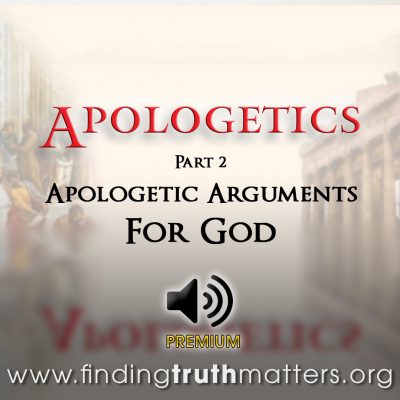
Apologetics Part 2 – The Apologetic Arguments For God, Premium Audio
Original price was: $1.75.$0.95Current price is: $0.95.









































0 Comments